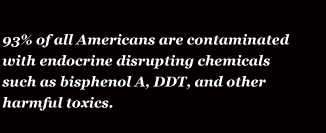


![]()
An Investigation into Bisphenol A in Canned Foods
Contact: Stephenie Hendricks 415 258-9151 stephdh@earthlink.net, Margie Kelly, Safer Chemicals, Healthy Families 541 344-2282, info@saferchemicals.org, Shannon Coughlin, Breast Cancer Fund 415-336-2246, scoughlin@breastcancerfund.org Elizabeth Hitchcock. U.S.PIRG, 202 546-9707, elizabeth@pirg.org
May 18, 2010
Everyday Exposure to Dangerous Levels of Toxic Chemical BPA
Unavoidable for U.S. Families
New Study Finds Foods Contaminated with Chemical
Linked to Chronic Diseases on the Rise
Senator Feinstein, others demand BPA ban in Food Safety Bill
(Washington, DC ) Senator Dianne Feinstein stood with environmental health advocates today on Capitol Hill to release a new report that demonstrates alarming levels of bisphenol A (BPA) in common canned foods. BPA is a synthetic sex hormone and exposure to low doses has been linked to abnormal behavior, diabetes and heart disease, infertility, developmental and reproductive harm, and obesity, which raises the risk of early puberty, a known risk factor for breast cancer.
Senator Feinstein has introduced legislation that would ban BPA in cans, in addition to other food and beverage containers. The Senator is hopeful that the Food Safety Act will include language that protects consumers from BPA exposure.
“We found in our analysis that if someone is eating just one meal with at least one canned food product, their levels of BPA are as much as those that have been shown to cause health effects in laboratory animal studies,” says Bobbi Chase Wilding of Clean New York, co-author, of No Silver Lining, An Investigation Into Bisphenol A in Canned Foods, by The National Workgroup for Safe Markets, a coalition of U.S. public health- and environmental health-focused organizations.
“Six states have taken crucial first steps this year to get this hormone mimicking chemical out of our children’s food, but this report shows that there is much more to be done. Senator Feinstein’s bill will protect much more of our food from this toxic contamination,” said U.S. Public Interest Research Group Public Health Advocate Elizabeth Hitchcock.
“BPA is a bad actor chemical that should not be in contact with food we eat,” says Laura Vandenberg, PhD, Tufts University, a leading BPA researcher. “Hundreds of independent peer-reviewed scientific studies have found harm from low doses of BPA and its inexcusable the chemical is still used in food cans.”
Dr. George Lundgren, a Minnesota family physician who was biomonitored and discovered BPA in his own body, has seen an increase in suspected BPA linked health effects in his patients: “The cases of diabetes and obesity are increasing at such a rate in my own practice that diet and lack of exercise alone just can’t explain it away. And the fact that there are no labels on the products that are exposing us to a chemical that may be linked to these serious health problems and other illness is disturbing.”
“Anyone who reads this report would agree that getting BPA out of food is an urgent food safety issue that demands immediate congressional action,” said Janet Nudelman, policy director at the Breast Cancer Fund. “Fortunately the Senate has the opportunity to address this problem right now by including strong protections against food-based exposures to BPA in the Food Safety Modernization Act. This is our best chance to protect Americans, especially our kids, from this toxic chemical.”
“We commissioned this study to see what level of BPA might be consumed from canned foods in a typical, everyday American diet,” explains Mia Davis from Clean Water Action, another of the report’s co-authors, “We wanted to know if the amount of BPA found in canned foods and beverages would be enough to affect a person’s health, or the health of their child if they are pregnant.”
Mike Schade from Center for Health, Environment & Justice, also a co-author, says, “General Mills just announced that it is removing BPA from its organic tomatoes’ cans, so we know that companies that want to do the right thing, will, but we need the FDA to insure a basic level of protection for consumers.”
Sarah Janssen, MD, PhD, staff scientist, Natural Resources Defense Council says,“The levels of BPA in our food supply have been associated with a wide range of health effects. Dozens of independent scientists, including the Director of NIEHS, have advised reducing BPA exposure. It’s time for FDA to act on their advice." NRDC filed a petition in October, 2008 asking FDA to revoke the approval of and ban BPA as a food additive. FDA has yet to rule on this petition.
BPA in canned foods is just one of thousands of ways we are exposed to dangerous chemicals in everyday products,” said Andy Igrejas, national campaign director for Safer Chemicals, Healthy Families, a coalition of 200 environmental and public health groups. “The proposed Safe Chemicals Act needs to be strengthened and passed so that people, especially children, are not bombarded with such hazards.”
Highlights:
- Levels in canned food that are the same or similar to levels of BPA found in the urine of over 90% of Americans by the Center for Disease Control and Prevention, and cord blood of newborn babies.
- One can of Del Monte green beans had the highest levels of BPA ever found in canned food, at 1140 parts per billion; EPA presumes BPA is safe at 50 parts per billion per day.
- The study tested 50 cans from 19 states and Ontario, Canada for BPA contamination, including cans with fish, fruits, vegetables, beans, soups, tomato products, sodas, and milks, which together represent common ingredient and meal options for a wide range of North American consumers.
- Test results showed there is inconsistency across brands and types of food, which prevents consumers from avoiding BPA just by looking at a label. In one case, two different cans of peas from two separate lots had an extreme difference: on had six parts per billion, while the other had over 300 parts per billion.
BPA has been banned from baby bottles and children’s sippy cups in six states (Connecticut, Maryland, Minnesota, Washington, Wisconsin, and Vermont), three counties in New York and the City of Chicago. Only Connecticut and Vermont restrict the use of BPA in cans of baby food.
Denmark has recently become the first country to enact a BPA ban and Canada has banned BPA in baby bottles while the French Senate is working to impose restrictions. Japan asked manufacturers for voluntary restriction of BPA from canned food in 1998 and saw a decline in their population’s levels of contamination.
The National Workgroup for Safe Markets is a coalition of U.S. public health and environmental NGOs including:
Alliance for a Healthy Tomorrow
Breast Cancer Fund
Center for Health, Environment and Justice
Clean New York
Clean Water Action
Coalition for a Safety & Healthy Connecticut
Environmental Defence (Canada)
Environmental Health Fund
Environmental Health Strategy Center
Healthy Legacy
Learning Disabilities Association of America
Oregon Environmental Council
Safer Chemicals, Healthy Families
Washington Toxics Coalition
Women’s Voices for the Earth
U.S. Public Interest Research Group
Available for Interviews
Bobbi Chase Wilding, Organizing Director, Clean New York, report co-author
518.708.3875, Clean.bobbi@gmail.com
Mia Davis, BPA Coordinator for Clean Water Action, Co-Coordinator, National Workgroup for Safe Markets, report co-author, 617.338.8131 ext 201, miadavis@cleanwater.org
Mike Schade, Center for Health, Environment and Justice. Mike can address retailers pulling BPA products from their shelves and changes with manufacturers. Report Co-author, 212.964.3680 mike@chej.org.
George Lundgren, MD, family practice physician, Shakopee, MN, biomonitored for BPA. 952.428.3535, 612.868.0455 (cell), gelundgren@comcast.net
Laura N. Vandenberg. Tufts University School of Medicine, BPA researcher. 617.636.0444, laura.vandenberg@tufts.edu
Janet Nudelman, Breast Cancer Fund, can address Feinstein amendment, President’s Cancer Panel Report with BPA reference and EPA identifying BPA in context with TSCA reform, call Shannon Coughlin, Breast Cancer Fund, 415-336-2246.
Nancy Buermeyer, Breast Cancer Fund, can address Feinstein amendment, President’s Cancer Panel Report with BPA reference and EPA identifying BPA in context with TSCA reform, nbuermeyer@breastcancerfund.org, or call Shannon Coughlin, Breast Cancer Fund, 415-336-2246.
Elizabeth Hitchcock. Public Health Advocate. U.S. Public Interest Research Group, (202) 546-9707, elizabeth@pirg.org, Liz is coordinating with Senator Feinstein’s office and can speak to BPA federal policy issues.
Sarah Janssen, MD, PhD, staff scientist at theNatural Resources Defense Council, 415.875.6126, sjanssen@nrdc.org. Dr. Janssen can address health effects linked to BPA exposure and scientific integrity issues regarding BPA regulatory process.
Andy Igreijas, national campaign manager for Safer Chemicals, Healthy Families. Contact Margie Kelly, Safer Chemicals, Healthy Families 541 344-2282, info@saferchemicals.org. Andy will address BPA in context with TSCA reform.
Naomi Starkman, Consumers Union, for Consumer's Union BPA in cans report information and to speak with toxicologist Urvashi Rangan, PhD. 917 539.3924 or nstarkman@gmail.com